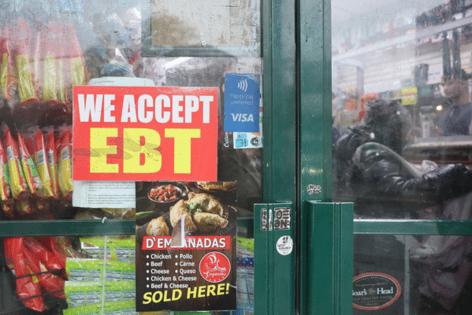Commentary: SNAP is vital to the nation's well-being
Published in Op Eds
As a single mother of two, I know what it means to work hard and still struggle to make ends meet. There was a time in my life when I relied on Supplemental Nutrition Assistance Program (SNAP) benefits to keep food on the table.
During that time, I was in college and always held a job, sometimes two. I submitted income reports every month as required to prove my eligibility for this assistance. Despite such safeguards, there remains a false narrative that reduces SNAP recipients to harmful stereotypes, often rooted in racism.
While two-thirds of SNAP participants are children, elderly or disabled, the vast majority of SNAP recipients who are capable of working do so. Many of those who work full-time face low wages and rising costs that make it impossible to get ahead.
Food assistance is not a handout; it is a lifeline that millions of hardworking Americans depend upon. That lifeline is now being threatened.
Due to the ongoing federal government shutdown, SNAP benefits have been disrupted, with only partial payments expected to be issued this month. There is no clear end to the shutdown in sight.
Across the country, more than 42 million people rely on SNAP to meet their basic nutritional needs. Among them are veterans, seniors, working parents and children. Their struggles may not always be visible, but their needs are real and urgent. And now they are being used as leverage in a political dispute.
While those in power continue to point fingers across the aisle, people are going hungry. There comes a time when it no longer matters who is to blame. What matters is that we are failing as a nation to uphold our most basic responsibility, which is to care for one another. And the people bearing the greatest weight of this failure are the ones who are least able to withstand it.
Access to food is not a privilege; it is a human right. The inability to meet that right reveals a moral failing that transcends party lines. When government systems falter, communities must rise.
We must look out for one another by donating to food pantries, supporting mutual aid networks, volunteering and checking in on neighbors who may be struggling in silence. Even small acts of compassion can sustain someone through their hardest days.
But charity is not a substitute for justice. While we help one another, we must also demand accountability from those in power. We must pay close attention to the priorities of our government, which often demonstrate a blatant disregard for the well-being of the citizens of our country. It is time for our elected officials to be reminded that the government exists to serve its people.
As we all know, the rich keep getting richer while millions of working families live one paycheck away from hunger or homelessness. We cannot accept this as normal. Programs like SNAP are not signs of weakness; they are reflections of a society that values compassion and fairness.
Investing in people through food assistance, health care and education strengthens our democracy and ensures that everyone can live with dignity. SNAP helped me through one of the hardest times in my life and gave me a foundation to build stability for my children. That is not something to be ashamed of; it is something to be grateful for and something worth protecting for others.
We must remind our leaders that government is meant to be of the people, by the people and for the people. The strength of our nation is not measured by wealth or political power but by how we care for the most vulnerable among us. It takes a village, and right now, that village needs to rise up.
_____
Sinceree Dixon is communications manager for the League of Women Voters of Wisconsin. This column was produced for Progressive Perspectives, a project of The Progressive magazine, and distributed by Tribune News Service.
_____
©2025 Tribune Content Agency, LLC.
























































Comments